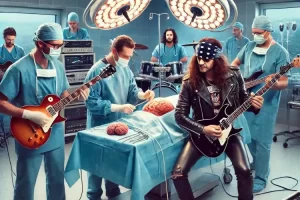Should surgeons treat family members if they have mastered the kind of operation their loved ones need?
I was rounding on patients in the ICU on a mundane Monday afternoon when my wife called. “Khursheed was playing in the hall and fell, cutting her head on the corner of the table. It’s bleeding profusely,” she said with a sense of panicked urgency, demanding that I do something from a distance. “Just apply pressure for 5 straight minutes without lifting your hand to see if it’s under control; it’ll stop,” I replied cogently, with the experience of treating several hundred scalp wounds. I wanted to add “All bleeding stops eventually. This is the golden rule of surgery. Either you are able to control it or the patient runs out of blood,” to lighten the situation, but if you sound a little too nonchalant in front of your wife when she’s alone at home dealing with a medical emergency that involves your own child, there might be another emergency you might have to deal with later on.
Our daughter was somewhere between 3 and 4 years old when this happened, a veritable dynamo: always racing around the house at fullspeed, designing her own obstacle course, jumping on couches and off chairs, falling several times a day. Every time she’d fall and we turned around to check if she was okay, she reassured us that she was. Most often she would get up immediately, stating, “I’m fine!” and we’d get back to doing whatever we were without moving an inch. Seldom has there been a huge explosion of tears that needs some emphatic consoling, and I suspect this fall belonged to the latter category. I called back to check in on the situation. “The bleeding has more or less stopped but the gash is bone deep,” she said, this time with less panic but more wariness. I suggested that she bring Khursheed to the hospital so that we could take a look and do what needed to be done.
Within the hour, my livewire of a child walked into the hospital, bravely holding my wife’s hand, her face streaked with the imprints of her dried-up tears. Her eyes were still red from the volcanic eruption that had taken place inside them. I gave her a warm and tight embrace, the kind that says everything’s going to be okay.“Dada, blood is bleeding!” she exclaimed dabbing her scalp and showing me a pink tinge of dried blood on her index finger. I inspected the wound all the while casually talking to her about how it happened and came to the conclusion that it needed a few stitches.
I plonked her on an empty bed in the ICU, shaved a bit of hair around the laceration, cleaned the wound, and without any hesitation or anesthesia, made two quick stitches, with her bellowing till her lungs were empty. But it was over in less than half a minute, and my howling child was silent again, like a bomb that had just been diffused. The doctor standing next to me wondered how I could do this to my own child, as she gleefully kissed me goodbye, somewhat proud of her new scar.
While this was a minor cut, it got me asking a slightly larger question. Should surgeons be operating on their own family members, if someone needed the kind of operation the surgeon was a pro at performing? For instance, god forbid, if my daughter had a brain tumor, would I have the courage to open up her skull and delicately tamper within areas that defined her identity and determined her consciousness? When we make decisions for patients, we do so like we would for our own family, but would the obverse also hold true? Should we treat a loved one just like we do any other patient or hand them over to someone who is more unattached?
The answer really boils down to emotional equanimity in the presence of a complex operation. Lumps and bumps, cuts or bruises can be treated by every doctor; otherwise, our families might question our very presence in the house. “What’s the use of you being a doctor?” my mom often wonders aloud when I refrain from giving an opinion on the myriad afflictions that plague her and her friends that have nothing to do with my specialty. I try to reason that the treatment of diabetes, blood pressure, and cardiac failure have evolved so much that I have no clue how to treat any of these, but the argument is futile.
Of course, by virtue of you being in the medical profession, you are a guiding light for family and friends who value your judgment and trust you to direct them to the concerned specialist, but would I be willing to bore a hole into the skull of someone with whom I eat dinner with everyday? Some argue that nothing would be more beautiful than that, while others may feel this to be completely inappropriate when you could easily find someone just as competent to do the job who would be able to maintain objectivity and be emotionally calm while performing complex brain and spine surgery. A complication from surgery may affect personal relationships, but conversely, a successful surgical outcome of great magnitude could create an intense interpersonal bond that might strengthen a relationship in a way a minor procedure never could.
In my conversations with several surgeons, most are willing to operate on family but very few are willing to have a family member (obviously a surgeon) operate on them. You are free to comprehend for yourself the dichotomy of this thought process.
The American Medical Association provides a code of ethics disallowing the treatment of one’s relatives, raising a concern that “professional objectivity may be compromised” and the “physician’s personal feelings may unduly influence professional medical judgment.” India, to my knowledge has no such regulation. With that in mind, my father, a neurosurgeon of great repute, has performed 20 successful surgeries on 16 family members, including one on me. His conviction is that the family could not get anyone better to do the job.
Fifteen years ago, I was admitted for the removal of a benign bone tumour in my foot, and he insisted that the primary orthopaedic surgeon allow him to take a bone graft from my iliac crest to harvest in the defect created by the removal of the tumour. The scar reminds me of him daily.
A few months after my daughter’s head had healed completely, my wife fell from her bicycle while on one of her evening rides. Thanks to a helmet, her head escaped unharmed, but she gashed her chin badly, it threatening to disconnect itself from the rest of the face. I could have easily sutured it up, but prudently requested my plastic surgeon to do the honours instead. Sometimes, discretion really is the better part of valour.




